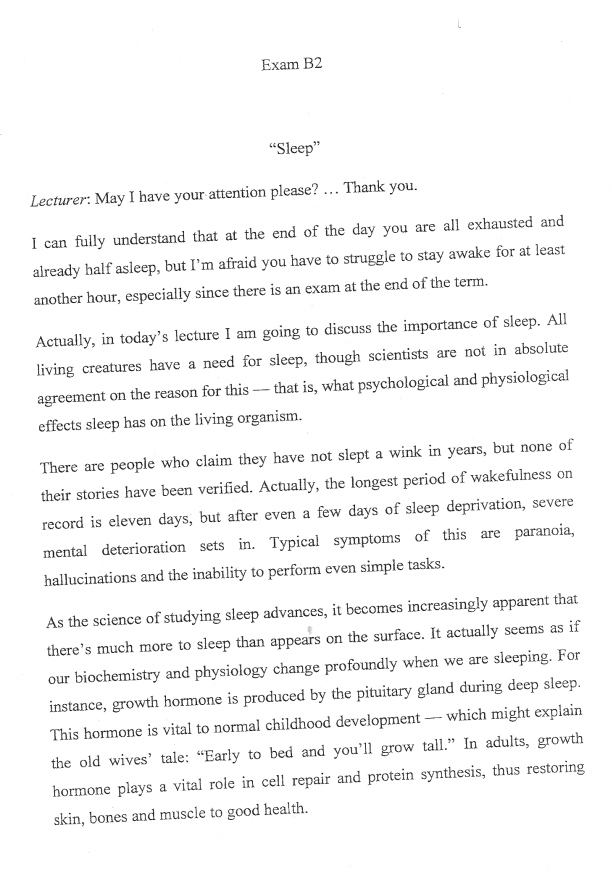angB11

Exam B2 “Sleep”
Lecturer: May I have your attention please? ... Thank you.
I can folly understand that at the end of the day you are all exhausted and already half asleep, but t’m afraid you have to struggle to stay awake for at least anotber hour, especially sińce there is an exara at the end of the term.
Actually, in today’s lecture I am going to discuss the importance of sleep. All living creatures have a need for sleep, though scientists are not in absolute agrcement on the reason for this — that is, what psychological and physiotogical effects sleep has on the living organism.
There are people who claim they have not slept a wink in years, but nonę of their stories have been verified. Actually, the longest period of wakefolness on record is eleven days, but after even a few days of sleep deprivation, severe mental deterioration sets in. Typical symptoms of this are paranoia, hallucinations and tlie inability to perform even simple tasks.
As the science of studying sleep advances, it becomes increasingly apparent that there’s much morę to sleep than appears on the surface. It actually seems as if our biochemistry and physiology change profoundly when we are sleeping. For instance, growth hormone is produced by the pituitary gland during deep sleep. This hormone is vital to normal childhood development — which might explain the old wives’ tale: “Early to bed and you’11 grow tali.” In adults, growth hormone plays a vital role in celi repair and protein synthesis, thus restoring skin, bones and muscle to good health.
Wyszukiwarka
Podobne podstrony:
9instlacja Ii? Java Setup - ProgressSDB Installing Java This may take a few minutes Status:Now you c
2469 a note from emily tlODI Hi Steven, Doi have your attention now? I know all about her, you dirty
Windows Server 03 Enterprise?ition 2009 12 01 22 06 33 Configure Your Server WizardServer Role You c
blog ser Welcome! This is your first Blog entry! You can erase this once you are ready to start your
carving?ceb 62 Working Examples You may well feel that at the moment you are technically unequipped
9. Hacksaw blade A useful tool which you can use lo draw a cable. The blade should have about 14 tee
blog Wełcome!Basic Blue <v Gray This is your first Blog entry! You can erase this once you are re
slackJoin the Slack workspace Fiszkoteka Fuli name By default, Slack will use your fuli name — but y
V V YOU may have been a tombou, but your athlctic build ispcrfcct for thc catioalk. i BEST CASU
cornetDM2510F8x620 CORNET YOU may have been a tomboy, but your alhletic build is perfect for th
Department ot Accounting and Finance Modules, otherthan Introductory modules may have pre-requisites
więcej podobnych podstron